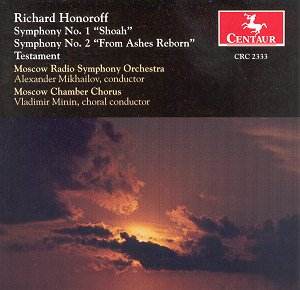The notes for this release tell us very little
about the composer, except that he is a multi-faceted musician:
pianist, composer, equally at home in popular music as well as
in concert music. He apparently wrote a considerable amount of
music for radio and television, and composed many logos for various
American broadcasting corporations as well as those for the 1988
and 1992 Olympic Games coverage. He is also quite active as a
jazz musician.
Needless to say that the three recent works recorded
here are in a totally different league and quite serious in intent.
Both Symphony No.1 "Shoah" and Testament
were composed for the Shoah Concert in Berlin, and were first
performed there in 1994. The composer mentions that his own family
had to escape from Nazi Germany whereas his wife’s family suffered
through the death camps. These commissions were thus most welcome,
allowing the composer "to play a part in insuring that this
dark history of the Holocaust would not pass unforgotten".
He does so in quite simple, though eloquent terms, both in the
First Symphony and in its companion piece Testament.
As far as I can judge, Honoroff’s music is rather non-developmental,
but rather proceeds by repetition of some simple, memorable basic
material, continuously varied in instrumental colours, somewhat
in the same way as in Ravel’s ubiquitous Bolero
or Kilar’s Exodus, to mention two fairly obvious
points of comparison. While listening to the First Symphony, I
kept thinking of Constant Lambert’s remark about the use of folk
songs in concert music: "All you can do with it, is repeat
it... louder". Fortunately enough, Honoroff’s folk-like,
modally inflected themes are quite memorable and his scoring is
remarkably varied. Moreover, he never attempts at making too much
of his themes, so that the music never outstays its welcome. One
may, however, feel somewhat frustrated by the lack of development
in music such as this. The movements often stop abruptly with
too little sense of real, goal-oriented finality. But, and this
is a big "But", the music, though unquestionably sincere,
never attempts at plumbing any great depths. It rather aims at
direct expression and communication in the most direct terms,
avoiding any overblown rhetoric. The poignancy of much of the
music is enhanced by its utter simplicity and – most importantly
– its restraint. Even in the second movement of the First Symphony
commemorating the Holocaust proper, the music is often redolent
of the quietest, most lyrical parts of John Williams’ beautiful
score for Schindler’s List rather than, say, of Schönberg’s
A Survivor from Warsaw. The symphony’s companion
piece Testament is quite similar in spirit and letter,
and might actually have been its fourth movement. A sincere, deeply
felt elegy for all its formal and thematic simplicity.
The Symphony No.2 "From Ashes Reborn",
too, is mostly elegiac, this time looking back on another 20th
Century tragedy, the Vietnam war. The composer again avoids any
jingoism and histrionics, and goes on reflecting on the "pity
of war", ending his piece with a peaceful hymn for chorus
and orchestra using a poem written by a Vietnam war veteran (unfortunately,
no words printed in the booklet), which beautifully rounds-off
this moving work.
The performances are fine indeed, well prepared,
committed and very well recorded.
Clearly, no great masterpieces here but undoubtedly
sincere, honest statements that deserve respect.
Hubert Culot
